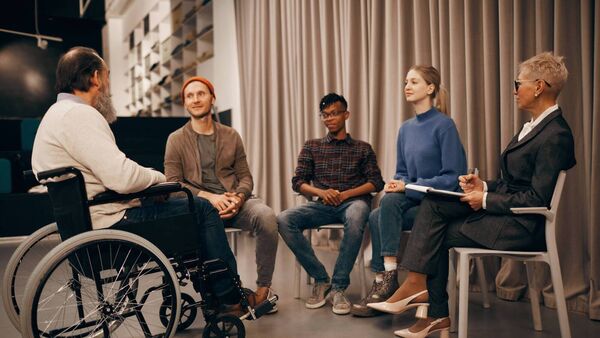New research into attitudes and perceptions of employers towards those with disabilities identifies many areas for improvement in the workforce.
A nationally representative sample of more than 250 private sector companies with more than twenty employees was surveyed by Behaviours & Attitudes on behalf of AHEAD and their Willing Able Mentoring (WAB) programme.
The study examines company diversity and inclusion policies, the value of diversity within the workforce, recruitment, reasonable accommodation, and disability in the workforce.
While progress has been made in recent years to accommodate graduates with disabilities entering the world of work, more must be done by Irish companies to ensure all of their employees can lead full professional lives.
Dara Ryder, chief executive officer of AHEAD, said: “Irish businesses are not short on aspiration, but this needs to be matched with ambition and action. It is reassuring to see that 76% of companies surveyed have a diversity and inclusion strategy.

“Among these, 79% specifically reference employees with disabilities. Since 2008, the number of respondents who have taken part in disability awareness or equality training has increased more than twofold from 26% to 64%.
“While these results are welcome, it is notable that only 37% of these same companies have targeted recruitment aimed at people with disabilities. Only 24% offer a specific employee resource group for people with disabilities.
“This suggests a disconnect between aspiration and action when it comes to actively recruiting and supporting people with disabilities once they are in the workplace. Diversity and inclusion policies are of little use if efforts aren’t made to actively encourage job applications from people with disabilities,” he continued.
Disability in the workforce
Among respondents, 83% believe hiring people with disabilities is of benefit to the organisation, while 75% consider it important to support business innovation. A further 86% of companies believe a workforce that represents the diversity of society allows it to better understand its customers’ needs.
Mr Ryder said: “People with disabilities navigate and overcome barriers each and every day. That means they are natural problem solvers and bring unique perspectives and skills to any workforce. These are qualities that should be in high demand.” The research also found that 67% of larger companies in Ireland are aware of having staff with a disability, compared with a quarter 25% in 2008.
Mr Ryder continued: “Given that one in eight new entrant third-level students self-identify as having a disability, it is remarkable to see that only two-thirds of companies are aware of having a staff member with a disability.
“This suggests that significant barriers remain in the recruitment process on graduation, and that sufficient positive opportunities for disclosure are not readily made available by organisations. This must be addressed in order to ensure companies can access this talent pool and support them to reach their potential.”
Disclosure
88% of employers believe graduates with disabilities should disclose prior to the job offer and 45% believe it is a breach of trust if they do not disclose their disability to their employer. However, only 54% of organisations proactively offer opportunities for candidates to disclose their disability during the recruitment process.
Mr Ryder said: “Disclosure is one of the most sensitive issues facing graduates as they prepare to enter the workplace. Without disclosure, it is difficult for employers to adequately support graduates with disabilities, but many graduates are reticent for a variety reasons and may have had negative experiences in the past.
“In order for people with disabilities to lead full professional lives, it is imperative that employers treat disclosure with the gravity and sensitivity it deserves, and create a positive environment where graduates can feel confident in asking for support.”
Goal to create “reasonable accommodation” at work
The research revealed a strong (78%) understanding among those with a senior HR remit of the term “reasonable accommodation”, which refers to a willingness to accommodate people’s needs with modifications and adjustments to the workplace.
Many of those surveyed said they are broadly open to facilitating a wide range of accommodations.
Mr Ryder added: “The broad openness among employers towards a wide range of accommodations is a very welcome finding. Given the high degree of openness toward almost all supports listed, as well as a broad understanding of what reasonable accommodation means, it is very surprising to see a relatively low level of awareness among employers of the Department of Social Protection’s Reasonable Accommodation Fund — only 26% of employers have heard of it.
“I would urge the Department of Social Protection to embark on an awareness campaign to ensure that employers are aware of the fund. Increased awareness would enable businesses to better facilitate the participation of people with disabilities in the workplace.”
For more information on AHEAD and WAM, visit www.ahead.ie/wam.










